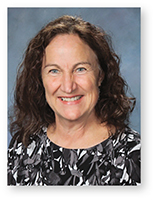Promoting Peer Growth Over Long Distance
October 01, 2018

When I accepted the superintendency of the Pateros School District in central Washington, one of the first questions that came to my mind was this: How could I bring about collaboration among staff members in our small, rural community to ensure Pateros
students acquired the career and process skills to succeed in the increasingly complex world around us?
In our K-12 school system with its 300 students, teachers typically carry full responsibility for one subject or grade level, with minimal
collaboration across disciplines. The teachers worked in their own classrooms doing what they loved in the area they taught. Some informal sharing might take place among friends while other teachers preferred to go it alone. The school had received
state recognition for academic success, so the staff showed limited hunger for networking with peers outside of our district, which is located at the confluence of the Methow and Columbia Rivers, midway between Seattle and Spokane.
From
an administrative perspective, the building leadership and I found ourselves in a remote community an hour or more away from the closest gatherings of colleagues who shared our professional roles. We were increasingly aware that the traditional teaching
methods had to evolve to cultivate interpersonal skills and increase student engagement in their learning. The challenge was to build a culture of collaboration among adults who have grown accustomed to working independently.
Sparking Momentum
We were enthusiastic to become involved in the Northwest Rural Innovation and Student Engagement Network, or NW RISE, after we were invited to participate in real-time dialogue with peers using online communication tools and twice-annual in-person opportunities
away from the district. This invitation appeared to be a gold mine. We would be one of three districts from Washington, joining a handful of others in Oregon, Idaho, Montana and Alaska.
The K-12 principal and two teachers joined me as we
began our collaboration with the NW RISE Network. We committed to create a culture that built capacity of teacher leaders. Through the peer-to-peer teaming, Pateros teachers began to build structures to address the need for students to own their own
learning.
Thanks to the NW RISE initiative’s momentum, our staff began to build ownership for a system of active, hands-on learning with students. Our work with the initiative complemented work in our school to expand the use of assessment
tools to monitor student academic growth and institute a more formal peer coaching model.

Overcoming Disaster
Pateros experienced a natural disaster when a massive wildfire, known as the Carlton Complex Fire, burned 260,000 acres, including more than 100 homes in July 2014. Up to four students in each classroom had their homes destroyed, and 20 percent of our
staff lost their houses. The economic impact in our community was devastating. Sixty percent of the destroyed homes were uninsured, and an additional 18 percent were underinsured.
The disaster brought Pateros together. We worked with local,
county, state and federal agencies to restore a vibrant community.
Although the disaster relief precluded our full participation in NW RISE activities for a period of time, I learned that the collaborative foundation we had established
proved stronger than the barriers. Local ownership takes place when the leading learners invite their peers to share what they have done. Today, Pateros is characterized by a commitment to professional learning and peer-to-peer solutions.
My experiences with classroom teachers, principals, superintendents, professors and interns through my work with NW RISE have been incredibly helpful in broadening my perspective on both the academic foundation and the practice of school leadership.
Author
Advertisement
Advertisement
Advertisement
Advertisement



